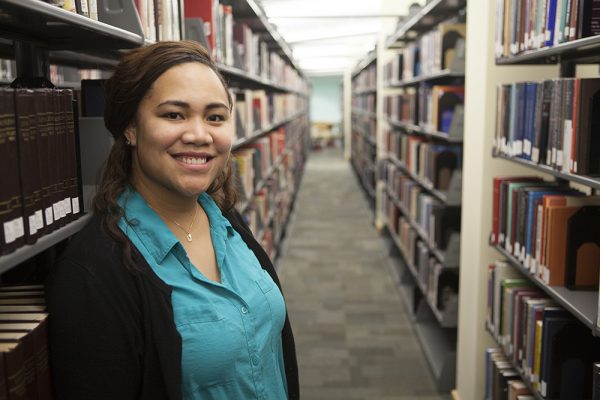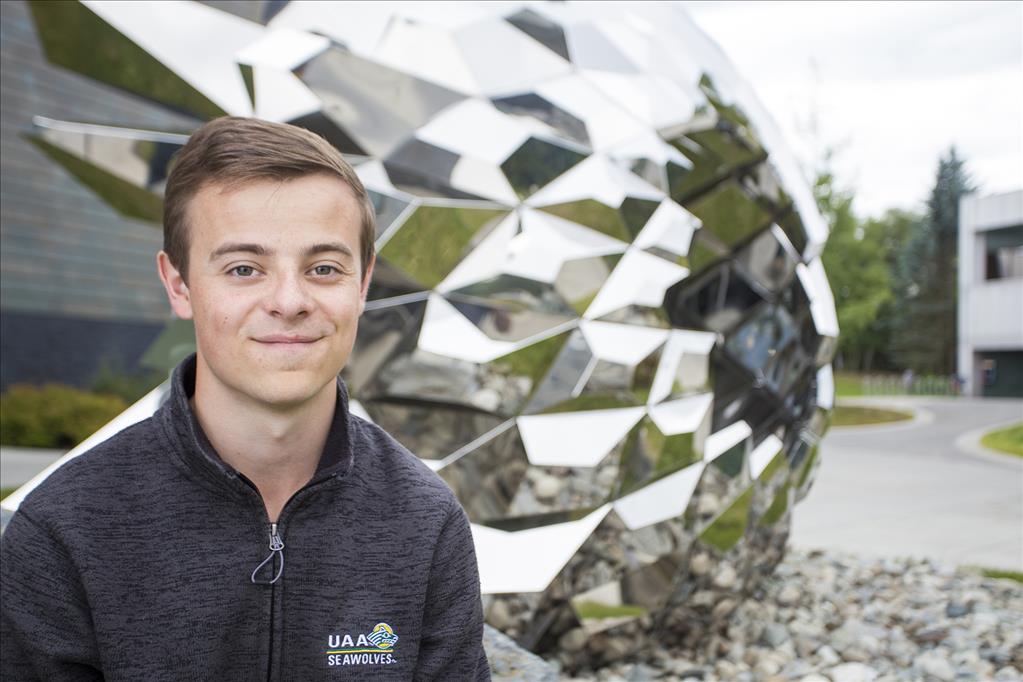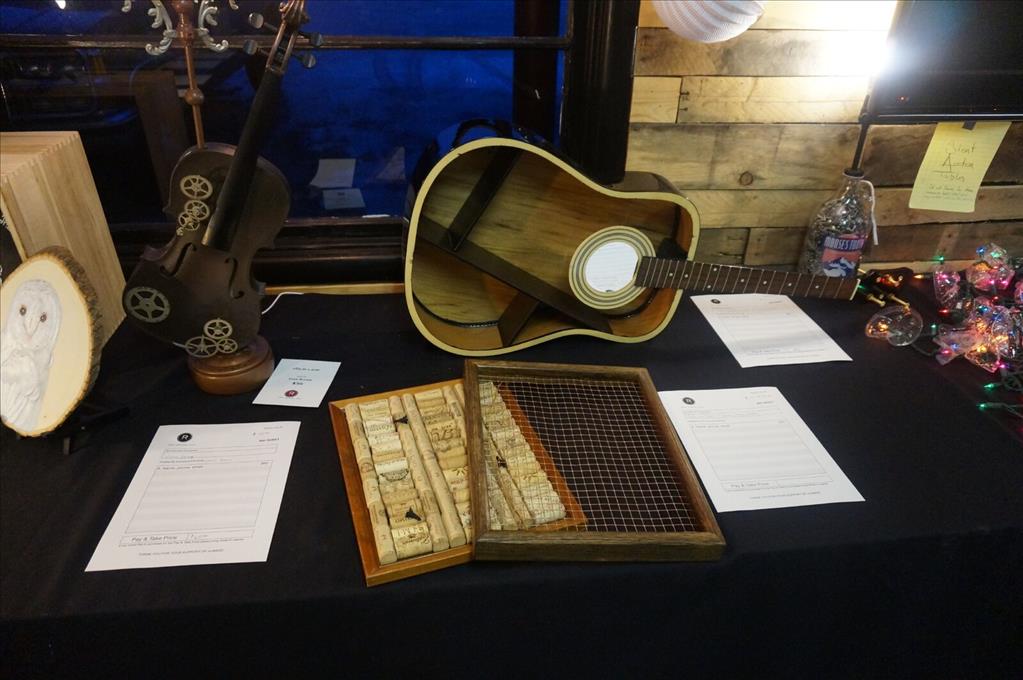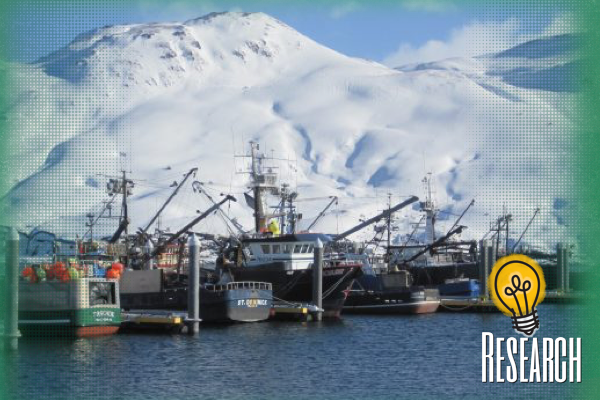Q-and-A: Ana Tatafu
by Tracy Kalytiak |
Ana Tatafu is a UAA accounting major who traveled to Guanajuato, Mexico, last summer after winning a scholarship through the Benjamin A. Gilman International Scholarship Program, an undergraduate grant program for U.S. citizens of limited financial means that enables them to study abroad. UAA's College of Business and Public Policy included her in this year's cohort of 21 CBPP Leadership Fellows Program protégés, who learn about real-world leadership from mentors in the Anchorage business community. Here, Ana talks about her life, family, and the family she found here at UAA's CBPP and the Multicultural Center.

Ana Tatafu is a Gilman scholar who studied in Mexico last summer and a protégé in the College of Business and Public Policy's Leadership Fellows program. Ana, a first-generation college student, expects to graduate with a bachelor's degree in accounting this spring. (Photo by Philip Hall / University of Alaska Anchorage)
Where are you from and what brought you to UAA?
My family is Tongan but I was born and raised in American Samoa. We migrated from there to Sacramento, Calif., and then to Anchorage. I went to Bartlett first and then graduated from West High School in 2011. I started in the CBPP accounting program in fall 2011, but spring 2013 was my last semester before I took a break to serve my Church of Latter-day Saints mission for 18 months. I started back up in fall 2015. Now, I'm a full-time student, graduating in spring 2017. That's kind of the timeline.
Why did your family leave American Samoa?
We left when I was 10, 11 years old, for family reunification. My parents grew up on the island of Tonga; their highest level of education was high school. They wanted to migrate to the United States because of the opportunities and education. They've seen struggles and obstacles and trials and wanted us to have a better life than theirs. My dad worked in a hardware company, but it wasn't enough, so he also had his own plantation where he would plant potatoes, fruits, and sell them on the side for money to provide for us. There were six of us. I'm the second oldest and a first-generation college student.
What's it like being a first-generation college student?
The transition was really, really smooth for me. In high school, I was introduced into the Educational Talent Search (ETS). The advisers there would help me a lot. Without them, I don't think I would have been able to be successful in high school and graduate and have this goal to further my education and be confident in myself and spread my wings and get out of my comfort zone.
How did ETS move you forward?
ETS in high school helped prepare me with the necessary things I needed to graduate from high school, tutors with classes I had difficulties with. They would provide tuition waivers and Megan Tompkins, who was my ETS adviser, made a huge impact on me. The process through ETS was very helpful and smooth to transition into UAA.
What programs help keep you on track here at UAA?
I'm currently active and involved in the SSS (Student Support Services) program. Having Connie [Carlisle], the SSS coordinator, is really helpful. They want us to be successful and have a plan to actually graduate from college, have something planned after graduation.
What is it like for you, having that support?
It's really nice to be able to have those resources, to make me feel like I'm at home even though I don't have a family that's familiar with college life and whatnot. Having them behind my back really helps me survive college. I love it. So far it hasn't been that difficult other than trying to do good in classes. But the overall college life has been really nice for me. It's like I have a big family here with their support.
Are others in your family planning to follow your path?
The second to youngest is planning to come here in the fall of 2017. I'm in the process of helping her out. She's lucky she has an older sister who's been to college! Now I'm helping her come here. I think she looks up to me, sees me as an example, which really makes her want to further her education and have something planned-not just have a job after school but an actual career, which will help all of us.
What first connected you with accounting?
In high school, I started taking some accounting electives and had a great professor, Miss Michael, at Bartlett High School. Taking her class was inspirational. She would talk about the accounting field, how important it is in the business world, invite CPAs and accountants to come in and do presentations for us. It really opened up how I view the accounting field, that it's something I can do. When I graduated from West, I knew accounting would be my major.
What is it about accounting that appeals to you?
I love working with numbers. Math has always been my favorite subject. Science, biology, physics, chemistry, my brain was functioning well when I was taking those classes. There's so much in accounting; it's more than just dealing with numbers. I could either get into audit or tax or maybe general accounting in a hospital or an accountant position in a business. I'd like to stay in Anchorage, get my CPA, see how it goes.
What accounting-related activities did you have a chance to get involved in at UAA?
Joining the accounting club and taking the upper-division accounting courses opened up my mind to reach out for my full potential. I wasn't thinking of getting a CPA, but with my professors and the accounting club and people coming in from BDO and KPMG — including my mentor Jed Ballard in the Leadership Fellows Program, who works for KPMG — talking about being an accountant and getting a CPA license, it really made me think about that a lot.
What experience motivated you to study abroad?
I went to Salt Lake City, Utah, out of all the places for my mission. I worked with Spanish-speaking people from South America. It was hard to learn. 'Hola' and 'gracias' were the only words I could remember; it was very difficult for me. After 18 months of practice, I was able to get the hang of it. Having to learn about somebody else's culture was amazing to me. My mission inspired me to join the La Tertulia Spanish club to keep up with my Spanish conversations. I began thinking of studying abroad and chose Mexico, because the majority of the people I've met were from there. I wanted to be immersed, learn the language more, learn how it is in the country. I applied for the Gilman scholarship, wrote an essay and a proposal with help from the UAA writing center, Leslie Tuovinen from Education Abroad, from the Multicultural Center. English is not my first language so I was grateful for the help and grateful for the scholarship-it was the perfect amount to pay for what I needed. I didn't have to pay out of pocket.
How has UAA's Multicultural Center enhanced your experience here?
It's so great to have connections here on campus; it really makes me feel like I'm at home. I have a big family here and then I get to go home to my big family as well. It's just a nice connection there.
What has it offered you?
It's so diverse. I love the diversity here at UAA and all the resources available for Alaska Natives, for African Americans, for Asians... all the colors. It's amazing. I love it.
MCC helped me a lot because they would have events where it's specifically focused on Polynesian. They showed a movie just recently that showcased the Polynesian culture, their love for sports. Me being there watching, I was able to participate and share my side of the story. Seeing other ethnicities and races promoting my culture and my traditions, it just makes me feel like, wow, there are other people who are actually out there appreciating me with my culture and tradition. It just makes me appreciate theirs as well. I want to learn about their differences and everything that's in between. And there are people there at MCC and other places at UAA: Leo Medal, Terry Nelson, Martha Massey, Connie, Dr. [E. André] Thorn, Leslie, Theresa Lyons, it's amazing to know them as well.
What is the best thing you have learned about these connections you've formed at UAA?
Knowing people is good because you never know what they might do for you to give you something you never thought of, give you an opportunity to do something great, or an opportunity to make you shine. I'm grateful to develop those relationships.
Written by Tracy Kalytiak, University of Alaska Anchorage
 "Q-and-A: Ana Tatafu" is licensed under a Creative Commons Attribution-NonCommercial 4.0 International License.
"Q-and-A: Ana Tatafu" is licensed under a Creative Commons Attribution-NonCommercial 4.0 International License.














